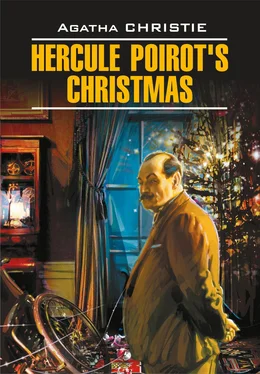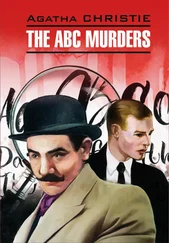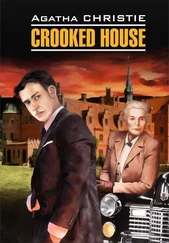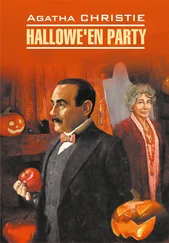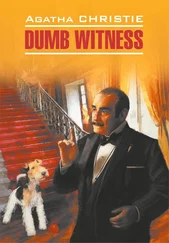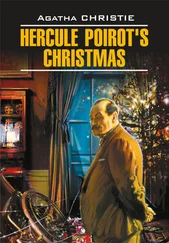He looked across inquiringly at Poirot. The latter said: ‘I think Miss Estravados has something to say.’
Pilar had gone very white. She said, in a breathless voice: ‘It is true. I would never have told you, but for Lydia and the money. To come here and pretend and cheat and act – that was fun, but when Lydia said the money was mine and that it was only justice, that was different; it was not fun any longer [409] it was not fun any longer – ( разг. ) это перестало быть шуткой
.’
Alfred Lee said with a puzzled face: ‘I do not understand, my dear, what you are talking about.’
Pilar said: ‘You think I am your niece, Pilar Estravados? But that is not so! Pilar was killed when I was travelling with her in a car in Spain. A bomb came and it hit the car and she was killed, but I was not touched. I did not know her very well, but she had told me all about herself and how her grandfather had sent for her to go to England and that he was very rich. And I had no money at all and I did not know where to go or what to do. And I thought suddenly: “Why should not I take Pilar’s passport and go to England and become very rich?” ’ Her face lit up with its sudden wide smile. ‘Oh, it was fun wondering if I could get away with it! Our faces on the photograph were not unlike. But when they wanted my passport here I opened the window and threw it out and ran down to get it, and then I rubbed some earth just over the face a little because at a barrier travelling they do not look very closely, but here they might – ’
Alfred Lee said angrily: ‘Do you mean to say that you represented yourself to my father as his granddaughter, and played on his affection for you?’
Pilar nodded. She said complacently: ‘Yes, I saw at once I could make him like me very much.’
George Lee broke out: ‘Preposterous!’ he spluttered. ‘Criminal! Attempting to get money by false pretences.’
Harry Lee said: ‘She didn’t get any from you, old boy! [410] She didn’t get any from you, old boy! – ( разг. ) Старик, от тебя-то она как раз ничего и не получила!
Pilar, I’m on your side! I’ve got a profound admiration for your daring. And, thank goodness, I’m not your uncle any more! That gives me a much freer hand.’
Pilar said to Poirot: ‘You knew? When did you know?’
Poirot smiled: ‘Mademoiselle, if you have studied the laws of Mendel [411] Mendel – Грегор Иоганн Мендель (1822–1884), австрийский монах, на гороховом поле изучал законы наследственности, используя гибридизацию сортов
you would know that two blue-eyed people are not likely to have a brown-eyed child. Your mother was, I was sure, a most chaste and respectable lady. It followed, then, that you were not Pilar Estravados at all. When you did your trick with the passport, I was quite sure of it. It was ingenious, but not, you understand, quite ingenious enough.’
Superintendent Sugden said unpleasantly: ‘The whole thing’s not quite ingenious enough.’
Pilar stared at him. She said: ‘I don’t understand…’
Sugden said: ‘You’ve told us a story – but I think there’s a good deal more you haven’t told.’
Stephen said: ‘You leave her alone!’
Superintendent Sugden took no notice. He went on: ‘You’ve told us that you went up to your grandfather’s room after dinner. You said it was an impulse on your part. I’m going to suggest something else. It was you who stole those diamonds. You’d handled them. On occasion, perhaps, you’d put them away in the safe and the old man hadn’t watched you do it! When he found the stones were missing, he saw at once that only two people could have taken them. One was Horbury, who might have got to know the combination and have crept in and stolen them during the night. The other person was you.
‘Well, Mr Lee at once took measures. He rang me up and had me come to see him. Then he sent word to you to come and see him immediately after dinner. You did so and he accused you of the theft. You denied it; he pressed the charge [412] pressed the charge – ( юр. ) выдвинул обвинение
. I don’t know what happened next – perhaps he tumbled to the fact that you weren’t his granddaughter, but a very clever little professional thief. Anyway, the game was up, exposure loomed over you, and you slashed at him with a knife. There was a struggle and he screamed. You were properly up against it then. You hurried out of the room, turned the key from the outside and then, knowing you could not get away, before the others came, you slipped into the recess by the statues.’
Pilar cried shrilly: ‘It is not true! It is not true! I did not steal the diamonds! I did not kill him. I swear it by the Blessed Virgin.’
Sugden said sharply: ‘Then who did? You say you saw a figure standing outside Mr Lee’s door. According to your story, that person must have been the murderer. No one else passed the recess! But we’ve only your word for it that there was a figure there at all. In other words, you made that up to exculpate yourself!’
George Lee said sharply: ‘Of course she’s guilty! It’s all clear enough! I always said an outsider killed my father! Preposterous nonsense to pretend one of his family would do a thing like that! It – it wouldn’t be natural!’
Poirot stirred in his seat. He said: ‘I disagree with you. Taking into consideration the character of Simeon Lee, it would be a very natural thing to happen.’
‘Eh?’ George’s jaw dropped. He stared at Poirot.
Poirot went on: ‘And, in my opinion, that very thing did happen [413] that very thing did happen – ( разг. ) именно это и произошло
. Simeon Lee was killed by his own flesh and blood, for what seemed to the murderer a very good and sufficient reason.’
George cried: ‘One of us? I deny – ’
Poirot’s voice broke in hard as steel. ‘There is a case against every person here. We will, Mr George Lee, begin with the case against you. You had no love for your father! You kept on good terms with him for the sake of money. On the day of his death he threatened to cut down your allowance. You knew that on his death you would probably inherit a very substantial sum. There is the motive. After dinner you went, as you say, to telephone. You did telephone – but the call lasted only five minutes. After that you could easily have gone to your father’s room, chatted with him, and then attacked him and killed him. You left the room and turned the key from outside, for you hoped the affair would be put down to a burglar. You omitted, in your panic, to make sure that the window was fully open so as to support the burglar theory. That was stupid; but you are, if you will pardon my saying so, rather a stupid man!
‘However,’ said Poirot, after a brief pause during which George tried to speak and failed, ‘many stupid men have been criminals!’
He turned his eyes on Magdalene. ‘Madame, too, she also had a motive. She is, I think, in debt, and the tone of certain of your father’s remarks may have caused her uneasiness. She, too, has no alibi. She went to telephone, but she did not telephone, and we have only her word for what she did do…
‘Then,’ he paused, ‘there is Mr David Lee. We have heard, not once but many times, of the revengeful tempers and long memories that went with the Lee blood. Mr David Lee did not forget or forgive the way his father had treated his mother. A final jibe directed at the dead lady may have been the last straw. David Lee is said to have been playing the piano at the time of the murder. By a coincidence he was playing the Dead March . But suppose somebody else was playing that Dead March , somebody who knew what he was going to do, and who approved his action?’
Читать дальше
Конец ознакомительного отрывка
Купить книгу
